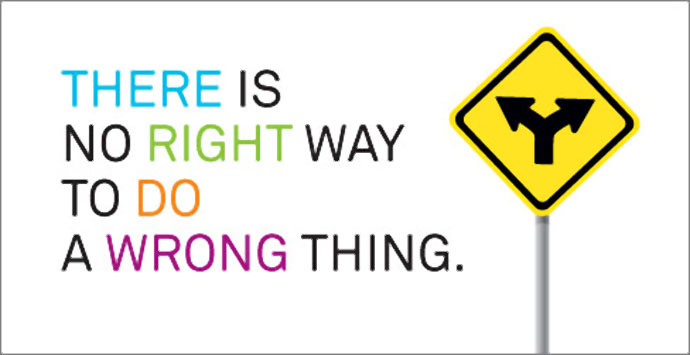 |
Chapter 4 of the Federal Republic of Nigeria’s 1999 Constitution guarantees a catalogue of enforceable fundamental rights; rights that are integral for ‘social man’ to co-habit in a secular state; an absolute imperative in a country that comprises over 500 languages and as many cultures.
In response to one of my earlier articles on ‘Subjective Morality’ where I had inferred that over time, Ethics is able to call morality - the existing standards for conduct - into question, and cause morality to change, a friend enquired about the origin of ethics. My postulation is that ethics emerged as a result of the ‘social man’, man’s need to co-exist and amicably share resources with others. Modern man came up with a written document, a constitution to encapsulate those ideals, especially when there exists the likelihood of a conflict with the several moralities as reflected in our various holy books and cultures. I asserted that Morals are rules and standards that we are told we must “conform” to when deciding what is “right” behavior….and that Morals are dictated to us by either culture, society or religion. Considering that there are several cultures, societies and religions on earth, hundreds, nay thousands of cultures with totally different ideas of morality, we have to rely on Ethics to interrogate these moralities, and time after time Ethics has saved the day, drawing man back from the brink of wanton bestiality into the umbra of civilization.
What we saw in the attack on Charlie Hebdo as well as what we experience back home, in the ongoing onslaught by Boko Haram, is essentially one society’s attempt to impose its morality on another. Some have argued that ‘I am not Charlie’, that the attack on Charlie Hebdo was not really an attack on free speech’. Al-Jazeera’s English editor and executive producer, Salah-Aldeen Khadr, allegedly sent out a staff-wide email which in part read ‘Defending freedom of expression in the face of oppression is one thing; insisting on the right to be obnoxious and offensive just because you can is infantile’, and many others have since echoed this sentiment or variations of it.
Unfortunately the problem with this line of thought is that it challenges the very fabric that enables people of different moral codes to co-habit amicably. For being obnoxious and offensive is premised on an Absolute or Universal Morality, that what Charlie Hebdo did was morally wrong in the context of Islam (or even that of some other faiths) thus it must be obnoxious to all and sundry. Do we then suggest that non-Muslims living in a Muslim community in line with their constitutionally guaranteed Right to life; Right to dignity of the human person; Right to personal liberty; Right to private and family life; Right to freedom of thought, conscience and religion; Right to peaceful assembly and association; Right to freedom of movement; Right to freedom from discrimination; Right to acquire and own immovable property anywhere in Nigeria (all as guaranteed in Chapter 4 of our Constitution) are being obnoxious and offensive? Why? Because the holy book of the predominant faith in the community they choose to live in, advocates that adherents kill non-believers.
So while Morality can claim that ‘I am not Charlie’, Ethics insists that I am Charlie, Baga and all those whose fundamental rights have been impugned. The attacks on Charlie and Baga are an attack on our right to life; the right to dignity of the human person, right to personal liberty, right to freedom of thought, conscience and religion. For you cannot hold me responsible for thinking that my actions are morally obnoxious in the same way that a man cannot rationalize raping a woman by claiming provocation by her ‘indecent’ exposure of too much skin.
As emotive and sensitive as religion can be…just pause and give this some thought.
Jekwu Ozoemene
Man should learn to live and let live. Judging your neighbour by your own standards and codes will make this impossible. This piece is apt and captures the essence of co existence
ReplyDelete